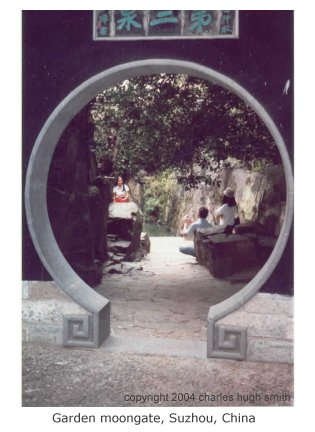| |
Is China a Bubble?
(November 21, 2006)
 Frequent correspondent Albert T. recently sent in comments and links on the question:
is China's economy a bubble? Here are his thought-provoking comments:
Frequent correspondent Albert T. recently sent in comments and links on the question:
is China's economy a bubble? Here are his thought-provoking comments:
The three articles below did it for me.
Excerpt from the first article...
China Rethinks Foreign Business Policies:
(A survey of 180 executives by the Urban Land Institute, a non-profit, U.S.-based research
group, found that a large share see China as a "must have," says Steve Blank, a senior
researcher at the institute. "People say, 'Go get me a piece of China. I'm not interested
in the details, just get me a piece.'")
A tale of two factories...a comparison of factories in China and
the U.S.... they forget to factor in
blackouts, substandard quality, and bribes to local officials.
This article just made a light bulb go up in my head:
Four U.S. firms that fought off China.
China is a transition from industrialized to automated ergo it is a place where all
industrialized nations outsource their outdated industrialized production until the
economics make it necessary to in source almost fully automated production. I remember
reading about Benetton about a year ago how instead of going to China they built an $800
million plant in Italy but instead of hundreds of workers it had dozens. I think it was
automated knitting and they wanted to keep quality control in house.
Now hypothetically all production is headed that way but until then some place needs to tide
the producers over. They will extract as much profit as possible using the old ways until
capital investment will make it beneficial in economic terms to switch over. As pressures
mount ergo costs rise in all aspects in China from political, wage, raw material, energy,
environmental and others, unforeseen competition will spring up.
Also the article on four manufacturers above basically made it completely clear. Those that
survived will thrive and perhaps either branch out and multiply/grow or consolidate/grow
into larger more efficient entities that are better able to compete. Now they will have
supreme advantages in quality control and just in time manufacturing once capital investment
into automation goes full force. But their biggest advantage is they will have local
oligopolies or monopolies. Imagine there were a few dozen mom and pops making springs in
Make Believe City, Virginia (not a real place) and today there are two both are forced
to become extremely efficient because they had to compete with China but all of their local
competitors are gone. Now the competitive landscape is barren and they became aware that
those springs from China are having shipment problems or break after people lay down on
the bed. Their orders grow and they must modernize to out compete/satisfy demand etc...
And the cycle goes the other way full force. Maybe someone invests to make a third maker
of springs in the area with the latest technology... Countries hurt the most by manufacturing
outsourcing will be the most efficient in the next cycle.
The external cost China bears today will weigh so heavily in the future on them that
it would overshadow any benefit today:
Environmental Valuation & Cost-Benefit News.
I think these are their official estimates:
GDP takes on a green hue in new figures.
Thank you, Albert, for the insightful links and commentary. From what I read,
Japan's global manufacturing corporations retain the most critical engineering and
production facilities in Japan. This is not happenstance; it's about competitive advantages
and the issues Albert raises in his commentary.
For more on this subject and a wide array of other topics, please visit
my weblog.
copyright © 2006 Charles Hugh Smith. All rights reserved in all media.
I would be honored if you linked this wEssay to your site, or printed a copy for your own use.
|
|


 Frequent correspondent Albert T. recently sent in comments and links on the question:
is China's economy a bubble? Here are his thought-provoking comments:
Frequent correspondent Albert T. recently sent in comments and links on the question:
is China's economy a bubble? Here are his thought-provoking comments: